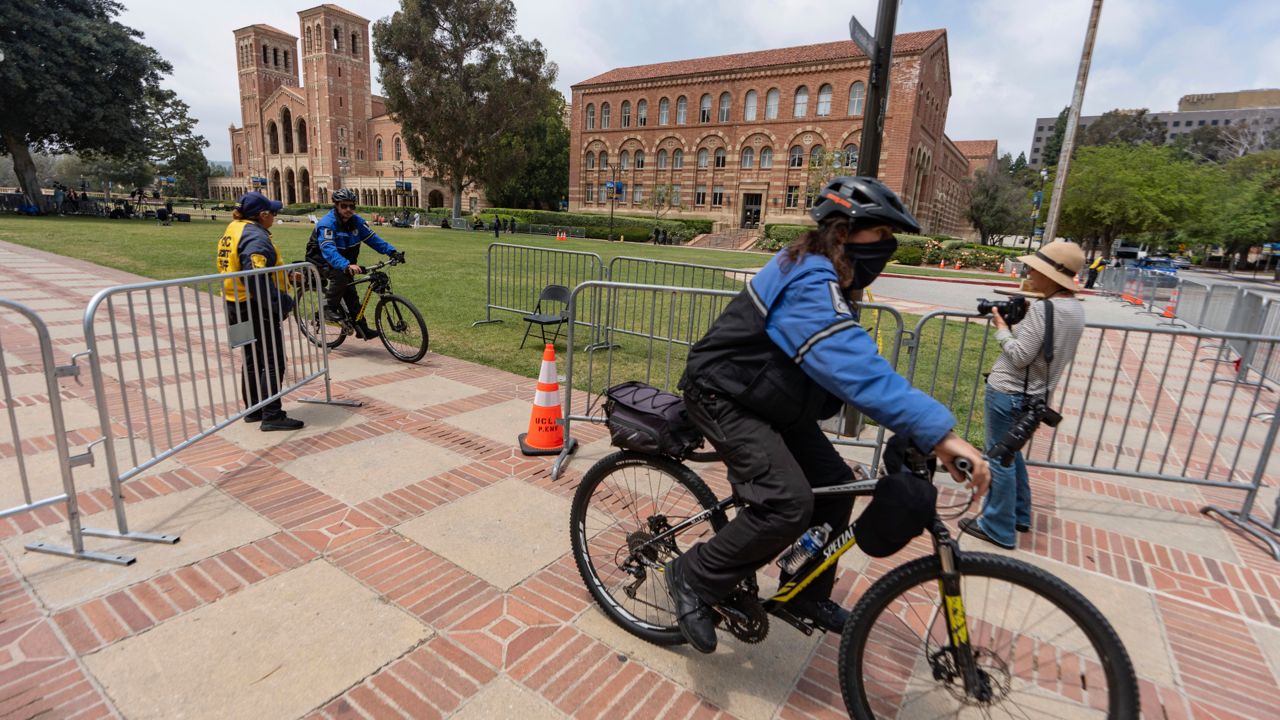LOS ANGELES — Three Jewish students who sued UCLA for allegedly allowing "antisemitic activists" to set up an encampment that prevented the students from attending classes were handed a win in federal court Monday when a judge ordered the university to devise a plan to prevent discriminatory actions from taking place on campus.
U.S. District Judge Mark C. Scarsi ruled that UCLA attorneys must meet with the students' lawyers and submit a plan to the judge by Aug. 5.
What You Need To Know
- Mary Osako, UCLA vice chancellor for strategic communications, said Monday the university is working to address the issues alleged in the lawsuit
- The students allege the so-called pro-Palestinian zones broke civil rights laws and discriminated against the university's Jewish students
- There are 2,500 Jewish Students at UCLA, representing 8% of the student body, and 500 Jewish graduate students, comprising 3% of the graduate student population, according to the Anti-Defamation League
- Police ultimately dismantled the UCLA encampment in an overnight operation that saw more than 200 people arrested
In the Los Angeles federal court complaint filed last month, two law students and an undergraduate student contend that UCLA allowed a group of students and outsiders to set up the pro-Palestinian encampment in April, and the participants stopped Jewish students and faculty from accessing the heart of campus.
The plaintiffs requested a preliminary injunction that would ban such encampments before students arrive on campus for the fall semester next month.
The students allege the so-called pro-Palestinian zones broke civil rights laws and discriminated against the university's Jewish students.
Mary Osako, UCLA vice chancellor for strategic communications, said Monday the university is working to address the issues alleged in the lawsuit.
"UCLA is committed to maintaining a safe and inclusive campus, holding those who engaged in violence accountable, and combating antisemitism in all forms," she said. "We have applied lessons learned from this spring's protests and continue to work to foster a campus culture where everyone feels welcome and free from intimidation, discrimination and harassment."
The plaintiffs' motion for a preliminary injunction against the encampments discusses what it describes as "UCLA's ongoing and egregious failure to provide Jewish students with equal access and equal treatment on its campus." The Jewish students argue that their education is suffering because of the alleged discrimination and asked that the court provide relief "so they can safely return to campus for 2024-2025 classes."
There are 2,500 Jewish Students at UCLA, representing 8% of the student body, and 500 Jewish graduate students, comprising 3% of the graduate student population, according to the Anti-Defamation League.
In the wake of the Hamas attacks on Israel on Oct. 7, 2023, and the ensuing warfare, pro-Palestinian demonstrations emerged on college campuses nationwide. Attorneys for the plaintiffs alleged in their court papers that by allowing the encampment on the Westwood campus, UCLA caused Jewish students and faculty to be barred from accessing parts of the campus "unless they agreed to disavow Israel's right to exist."
"No student should have to fear for their safety or pass a religious test to walk freely at a public university," said Mark Rienzi, president of the Becket law firm and an attorney for the students. "UCLA's behavior on this issue has been shameful, and the students need a court order to allow them to return to campus safely this fall."
According to the plaintiffs, the activists — many of them masked — used checkpoints, issued wrist bands, built barriers, and often locked arms to prevent Jewish students from passing through.
For a week, the lawsuit contends, UCLA's administration was aware of these practices and chose to let them persist. The suit alleges that rather than clearing the encampment, UCLA instructed security staff to discourage unapproved students from attempting to cross through the areas blocked by the activists.
"If masked agitators had excluded any other marginalized group at UCLA, Gov. Gavin Newsom rightly would have sent in the National Guard immediately," Rienzi said. "But UCLA instead caved to the antisemitic activists and allowed its Jewish students to be segregated from the heart of their own campus. That is a profound and illegal failure of leadership."
Rienzi, whose firm filed the 34-page motion for an injunction, alleges that activists within the pro-Palestinian encampment targeted Jewish students.
Plaintiff Yitzchok Frankel, a law student and father of four, claims he faced antisemitic harassment and was forced to abandon his regular routes through campus because of the so-called Jewish "exclusion zone," the lawsuit states.
Joshua Ghayoum, a sophomore and history major, says he was repeatedly blocked from accessing the library and other public spaces. Ghayoum alleges he heard chants at the encampment including "death to Jews," according to the suit.
The third plaintiff, law student Eden Shemuelian, alleges her final exam studies were severely compromised when she was forced to walk around the encampment and face antisemitic chants and signs to access the law school's library.
"It's appalling that an elite American university would actively support and encourage masked mobs of antisemites," Rienzi said. "UCLA's Jewish community needs to know that they'll be safe on campus before the start of the fall semester."
Police ultimately dismantled the UCLA encampment in an overnight operation that saw more than 200 people arrested.
Supporters of the demonstrators have accused officials of ignoring a violent attack on the encampment by counterprotesters on April 30, while being quick to arrest those sympathetic to the Palestinians.



